
Energy Star is a program run by the U.S. Environmental Protection Agency (EPA) and U.S. Department of Energy (DOE) that promotes energy efficiency. The program provides information on the energy consumption of products and devices using different standardized methods. The Energy Star label is found on more than 75 different certified product categories, homes, commercial buildings, and industrial plants. In the United States, the Energy Star label is also shown on the Energy Guide appliance label of qualifying products.

Organic certification is a certification process for producers of organic food and other organic agricultural products. In general, any business directly involved in food production can be certified, including seed suppliers, farmers, food processors, retailers and restaurants. A lesser known counterpart is certification for organic textiles that includes certification of textile products made from organically grown fibres.

The Forest Stewardship Council GmbH (FSC) is an international non-profit, multistakeholder organization established in 1993 that promotes responsible management of the world's forests via timber certification. This organization uses a market-based approach to transnational environmental policy.
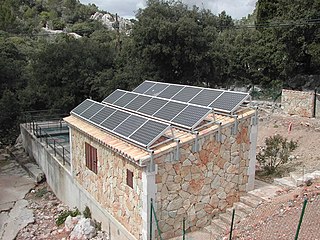
Environment friendly processes, or environmental-friendly processes, are sustainability and marketing terms referring to goods and services, laws, guidelines and policies that claim reduced, minimal, or no harm upon ecosystems or the environment.

The Marine Stewardship Council (MSC) is a non-profit organisation which aims to set standards for sustainable fishing. Fisheries that wish to demonstrate they are well-managed and sustainable compared to the MSC's standards are assessed by a team of Conformity Assessment Bodies (CABs).
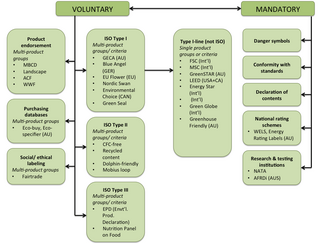
Ecolabels and Green Stickers are labeling systems for food and consumer products. The use of ecolabels is voluntary, whereas green stickers are mandated by law; for example, in North America major appliances and automobiles use Energy Star. They are a form of sustainability measurement directed at consumers, intended to make it easy to take environmental concerns into account when shopping. Some labels quantify pollution or energy consumption by way of index scores or units of measurement, while others assert compliance with a set of practices or minimum requirements for sustainability or reduction of harm to the environment. Many ecolabels are focused on minimising the negative ecological impacts of primary production or resource extraction in a given sector or commodity through a set of good practices that are captured in a sustainability standard. Through a verification process, usually referred to as "certification", a farm, forest, fishery, or mine can show that it complies with a standard and earn the right to sell its products as certified through the supply chain, often resulting in a consumer-facing ecolabel.
The Global Ecolabelling Network (GEN) is a non-profit network composed of some 29 ecolabel organisations throughout the world representing nearly 60 countries and territories, with two associate members and a growing number of affiliate members, one of which is Google. GEN members have certified over 252,000 products and services for environmental leadership. GEN was established in 1994.

The Environmental Choice Program is an ecolabelling scheme that was established by Environment Canada in 1988 with over 300 categories of products to help consumers identify services/products which are less harmful to the environment.
The work of the Helmholtz Centre for Environmental Research – UFZ covers both basic research and applied research.
Sustainable seafood is seafood that is caught or farmed in ways that consider the long-term vitality of harvested species and the well-being of the oceans, as well as the livelihoods of fisheries-dependent communities. It was first promoted through the sustainable seafood movement which began in the 1990s. This operation highlights overfishing and environmentally destructive fishing methods. Through a number of initiatives, the movement has increased awareness and raised concerns over the way our seafood is obtained.

The Nordic Ecolabel or Nordic swan is the official sustainability ecolabel for products from the Nordic countries. It was introduced by the Nordic Council of Ministers in 1989. The logo is based on the logo of the Nordic Council adopted in 1984 which symbolises trust, integrity and freedom. The Nordic Swan covers 67 different product groups, from hand soap to furniture to hotels.
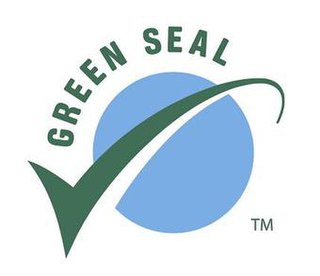
Green Seal is a non-profit environmental standard development and certification organization. Its flagship program is the certification of products and services. Certification is based on Green Seal standards, which contain performance, health, and sustainability criteria.
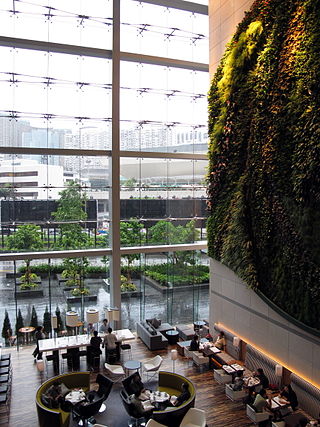
An eco hotel, or a green hotel, is an environmentally sustainable hotel or accommodation that has made important environmental improvements to its structure in order to minimize its impact on the natural environment. The basic definition of an eco-friendly hotel is an environmentally responsible lodging that follows the practices of green living. These hotels have to be certified green by an independent third-party or by the state they are located in. Traditionally, these hotels were mostly presented as ecolodges because of their location, often in jungles, and their design inspired by the use of traditional building methods applied by skilled local craftsmen in areas, such as Costa Rica and Indonesia.
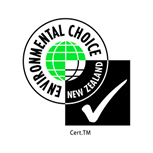
Environmental Choice New Zealand (ECNZ) is the official ecolabel of New Zealand. The label is owned and endorsed by the Ministry for the Environment of the New Zealand Government. The Environmental Choice programme, which started in 1992, is administered by the New Zealand Ecolabelling Trust on behalf of, but independently from, the Ministry for the Environment. The trust and the programme are part of the Global Ecolabelling Network.
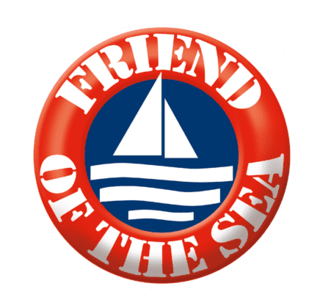
Friend of the Sea is a project of the World Sustainability Organization for the certification and promotion of seafood from sustainable fisheries and sustainable aquaculture. It is the only certification scheme which, with the same logo, certifies both wild and farmed seafood.
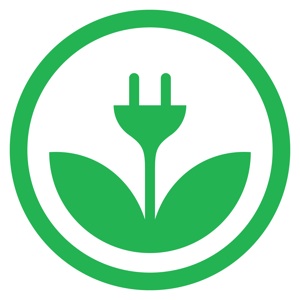
EKOenergy is a globally active nonprofit ecolabel for renewable energy. It is owned by the Finnish Association for Nature Conservation and managed in cooperation with other environmental NGOs.
Sustainable products are products who are either sustainability sourced, manufactured or processed that provide environmental, social and economic benefits while protecting public health and environment over their whole life cycle, from the extraction of raw materials until the final disposal.
Environmental certification is a form of environmental regulation and development where a company can voluntarily choose to comply with predefined processes or objectives set forth by the certification service. Most certification services have a logo which can be applied to products certified under their standards. This is seen as a form of corporate social responsibility allowing companies to address their obligation to minimise the harmful impacts to the environment by voluntarily following a set of externally set and measured objectives.
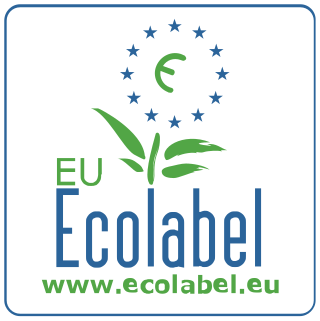
EU Ecolabel or EU Flower is a voluntary ecolabel scheme established in 1992 by the European Union.

The Umweltbundesamt is the environment agency of the German government. Together with the Bundesamt für Naturschutz, the Bundesamt für kerntechnische Entsorgungssicherheit, and the Bundesamt für Strahlenschutz, it operates under the jurisdiction of the Federal Ministry of the Environment, Nature Conservation, and Nuclear Safety. The tasks of the office are primarily "the scientific support of the federal government, the implementation of environmental laws, and public information on environmental protection", based on independent research. With around 1,600 employees, the agency is the largest environmental authority in Europe.















